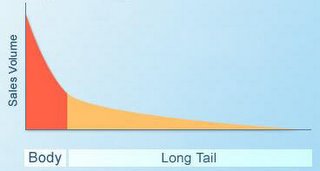Long Tail

In October 2004 Chris Anderson wrote an article in Wired called The Long Tail, which is a theory of economics. More specifically its a theory of retail entertainment economics. He now has a blog all about it, and his experience writing a book all about it.
The theory should be of interest to anyone involved in the entertainment business, and anyone who is a consumer of the entertainment business, which more or less means all of us.
 To get an idea of what its all about, imagine a graph of the sales of a book (or CD or DVD) over time. There will be an initial huge peak as most sales are when it is first released and promoted. That peak tails off fairly quickly, especially for singles and the graph ends up not quite reaching zero but showing a low level of sales over a long time. That is the long tail of the graph, and the point is that the sales of small numbers of tens of thousands of old products (back catalogue) add up to more than the sales of huge numbers of the few hundred current bestsellers.
To get an idea of what its all about, imagine a graph of the sales of a book (or CD or DVD) over time. There will be an initial huge peak as most sales are when it is first released and promoted. That peak tails off fairly quickly, especially for singles and the graph ends up not quite reaching zero but showing a low level of sales over a long time. That is the long tail of the graph, and the point is that the sales of small numbers of tens of thousands of old products (back catalogue) add up to more than the sales of huge numbers of the few hundred current bestsellers.In old-fashioned physical shops it is not economically viable to stock all that back catalogue for reasons of shelf space and the fact that the potential customer base can be so dispersed that most items might not find a buyer near any given shop. With Internet sellers they can actually make stocking the old stuff viable. In fact the statistic from yesterday's paper was that Amazon makes half its sales from titles outside its top 130,000.
Its a mind-blowing concept, but not only that, its a great name for a band!
I have tastes which are often outside the current chart, so the idea that Internet stores will be more likely to stock stuff I want can only be good news.
The Long Tail would be a band who are not likely to be high in the charts, and would be making that statement in their name, but they would not consider this to be failure: they recognise that they can still make a living in the long term by expoiting the possibilities of the new Internet economy. However, the band might not have much of a sense of humour - having named themselves after an economic theory.


0 Comments:
Post a Comment
<< Home